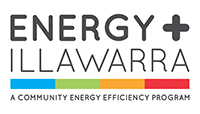THE LAUNDRY
WASHING MACHINES
Many people now use the cold wash cycle for the majority of their washing, as this can reduce energy use by up to 80%. Wash on a cold wash cycle as often as possible.
It’s also a good idea to only use your washing machine when you have a full load of clothing. This saves you extra work and uses less energy.
Both top and front loader washing machines can be very energy efficient these days – the important thing is to check and compare their kWh rating and their star rating.
Front loader washing machines also use roughly 50% less water than top loaders.
- Like all large appliances, washing machines have an energy sticker, so be sure to check the kWh rating.
- Check for a cold wash option as this can reduce energy use by up to 80%.
- If you sometimes wash with hot water and have an efficient hot-water system (e.g. gas, heat-pump or solar) try to choose a washing machine with both hot and cold water connections. This means that the washing machine gets its hot water from your efficient water heater, rather than heating it in the washing machine.
- Some models now have load sensing technology which can adjust the amount of water they use to suit your load size.
- Another important issue is the maximum spin-dry speed available on your washing machine. The more you spin-dry your clothes, the less water is left when you come to dry them – and the less energy you will use if you use an electric dryer. If you dry your clothes on a line, you may consider using lower spin speeds so that clothes crease less.
DRYERS
So we recommend you dry all of your washing on an outside line whenever the weather is dry.
However when you need to use your dryer there are ways to do it more efficiently.
- Try to separate your heavy and lightweight clothing and not overload the dryer.
- Dry several loads one after the other to make use of the heat in the machine from the previous load.
- Keep the surrounding area well ventilated to minimise the build up of humidity. You could leave a window open or install a venting kit, as this will expel moist air directly outside.
- Clean the filter before each use. Not only does this save energy but a blocked filter can be a potential fire hazard.
Older electric dryers are very inefficient. There are a number of newer dryer technologies, such as heat pump and gas dryers, that are much more efficient and may be worth considering if you use your clothes dryer frequently.
Avoid buying a bigger drier than you need. If you buy a big drier, but only partially fill it every time you use it, this will result in higher energy use as the big drier takes more energy to heat up.
Check the star rating of the dryer and buy one with a high star rating.
Look for models with auto sensors that can help you to avoid over-drying and using excess energy.
COMBINED WASHER-DRYERS
As their name indicates, these machines are a clothes washer and dryer in one. Be sure to look out for the two energy rating labels on combined washer dryers, as these labels detail the efficiency of the product as both a washing machine and clothes dryer.
HEAT PUMP DRYERS
These clothes dryers use a heat pump to produce hot air, and operate similarly to reverse-cycle air conditioners when heating. These machines are highly efficient and generally use less than half the energy of conventional electric clothes dryers of the same size. But be aware that for a small household, if the dryer is a large unit, and you have relatively little washing for each load, the large heat pump dryer may end up costing as much to run as a smaller less efficient drier.
GAS DRYERS
These clothes dryers use gas to heat air, and therefore need to be connected to a gas supply. Although they are more expensive to purchase upfront, their running costs are generally much cheaper as they operate using natural gas. Gas clothes dryers are a good option for households that use their dryer frequently and are already on mains gas.
